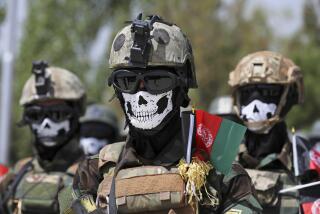Petraeus’ risky militia maneuver for Afghanistan
- Share via
Handing out guns in Afghanistan has been risky business through the ages, yet arming Afghan village defense forces is central to Army Gen. David H. Petraeus’ strategy against the Taliban. The commander of U.S. and NATO forces in Afghanistan is taking a page out of the counterinsurgency manual he drafted for Iraq, where he successfully coaxed Sunni Arab fighters into government-allied local defense units. But that doesn’t mean it will work to hire local hands in the treacherous terrain of Afghanistan, where several foreign powers have tried and failed to control the gunmen. Americans often are accused of having short memories, but Afghans clearly recall the Russian-recruited militias that brutalized the countryside and then fought one another in the 1990s after the Soviet withdrawal. International forces have worked to disarm militias since the fall of the Taliban.
There are good arguments for engaging villagers to defend their own neighborhoods in remote areas of southern Afghanistan that are not firmly under the control of U.S.-backed government forces or the Taliban, not the least of which is that Petraeus doesn’t have enough international and Afghan government troops to protect every hamlet against Taliban infiltration. But even if he did, outsiders typically are viewed with suspicion, while locals have better intelligence and a stake in protecting their families. They are the best eyes and ears on the ground. The squads will receive minimal defensive training from Special Forces, and uniforms, weapons and a monthly salary that is intended to give them a stake in the central government of President Hamid Karzai as well. That should free seasoned combat troops for battle in heavily contested areas.
The defense units will be local police forces, “not militia, no way,” an Afghan government official was quoted as saying. Call it what they will, this is tribal Afghanistan, and an armed force by any name can be an unpredictable thing. The country has a history of warlords and corruption, tribal feuds and armed leaders who demand bribes or impose taxes. Loyalties may go to the most feared or to the highest bidder rather than to the government. Although these recruits are not believed to be insurgents, as the Sunnis were, they are likely to be allied with provincial power brokers. Karzai insisted that the defense units report to the Interior Ministry, rather than to the U.S. military, to ensure that he retains control. Petraeus conceded and tried to reassure him that the forces were a temporary solution against the insurgency. They may well help in the fight against the Taliban. The question is how to ensure that they remain on the side of the central government.
More to Read
Sign up for Essential California
The most important California stories and recommendations in your inbox every morning.
You may occasionally receive promotional content from the Los Angeles Times.













